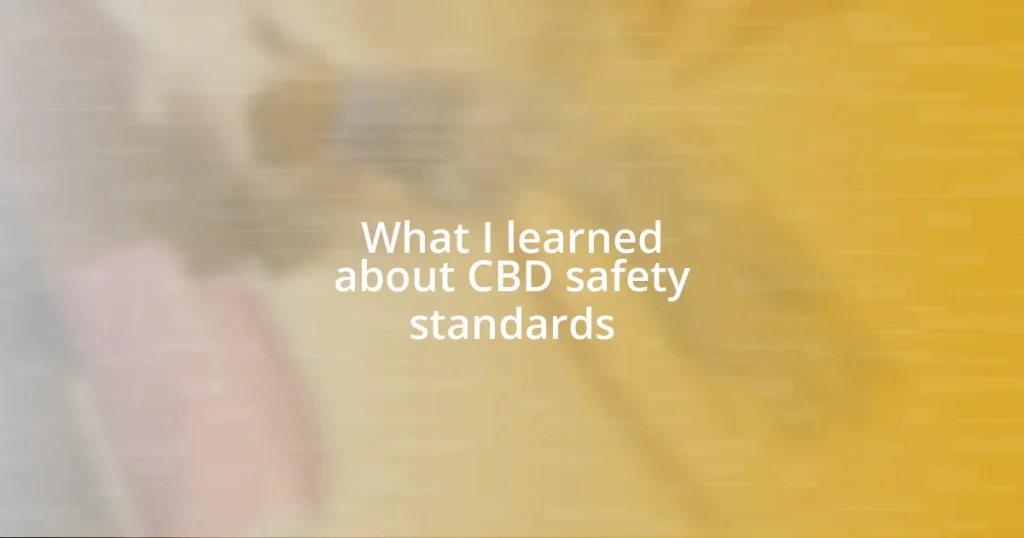Key takeaways:
- Third-party testing and Certificates of Analysis (COA) are essential for verifying the purity and potency of CBD products, providing consumers with confidence in their choices.
- Quality control practices, including batch consistency and clear labeling, significantly impact the safety and efficacy of CBD products.
- Regulatory compliance and transparent labeling are crucial for consumer trust, as they ensure accurate information about the products being sold.
- Accountability in CBD manufacturing fosters consumer connection and trust, highlighting the importance of ethical practices and open communication from brands.
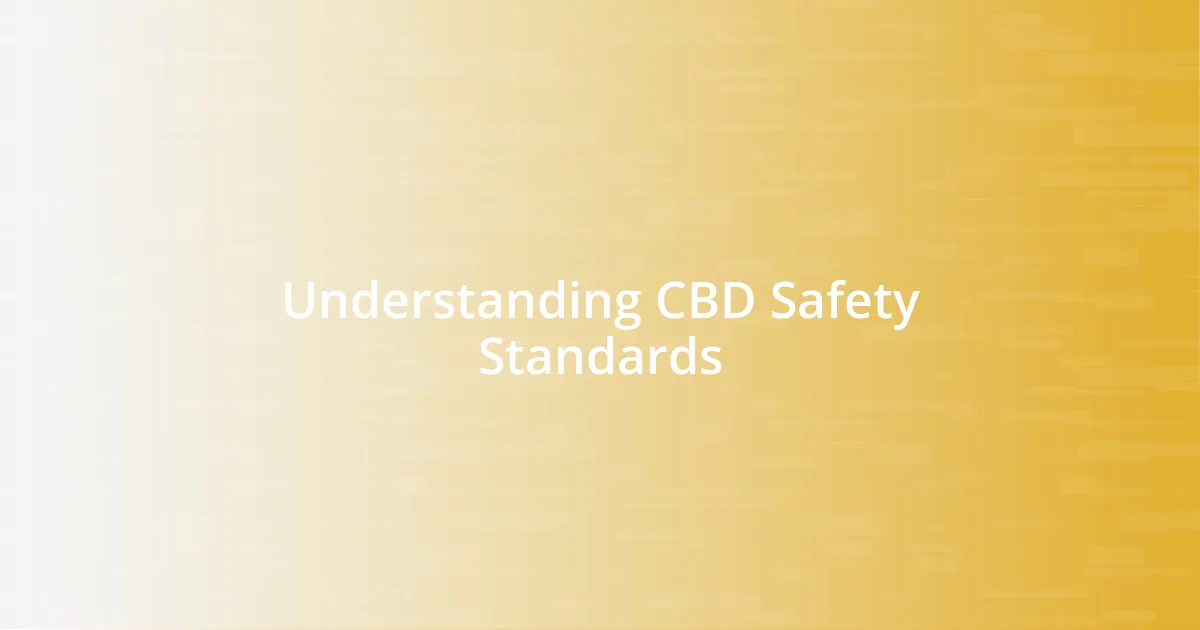
Understanding CBD Safety Standards
When I first delved into the world of CBD, I was amazed at the nuances of safety standards that govern its production. It’s not just about growing the hemp; it’s a meticulous process that includes lab testing for contaminants like pesticides and heavy metals. Have you ever wondered what goes into ensuring the purity of a product you might be using?
I remember the first time I checked a CBD product’s certification. Seeing that it had passed third-party lab tests gave me a sense of relief and trust. This is crucial; it ensures you’re not just buying a pretty label but something that’s verified for safety and efficacy. It’s like having a trusted friend recommend a restaurant because they know the kitchen is clean.
Moreover, understanding these standards can be empowering. When I educate myself about the different extraction methods and their implications for safety, I feel more in control of my choices. For instance, CO2 extraction is often praised for its ability to produce clean, high-quality CBD. Isn’t it incredible how informed decisions can elevate our wellness journey?
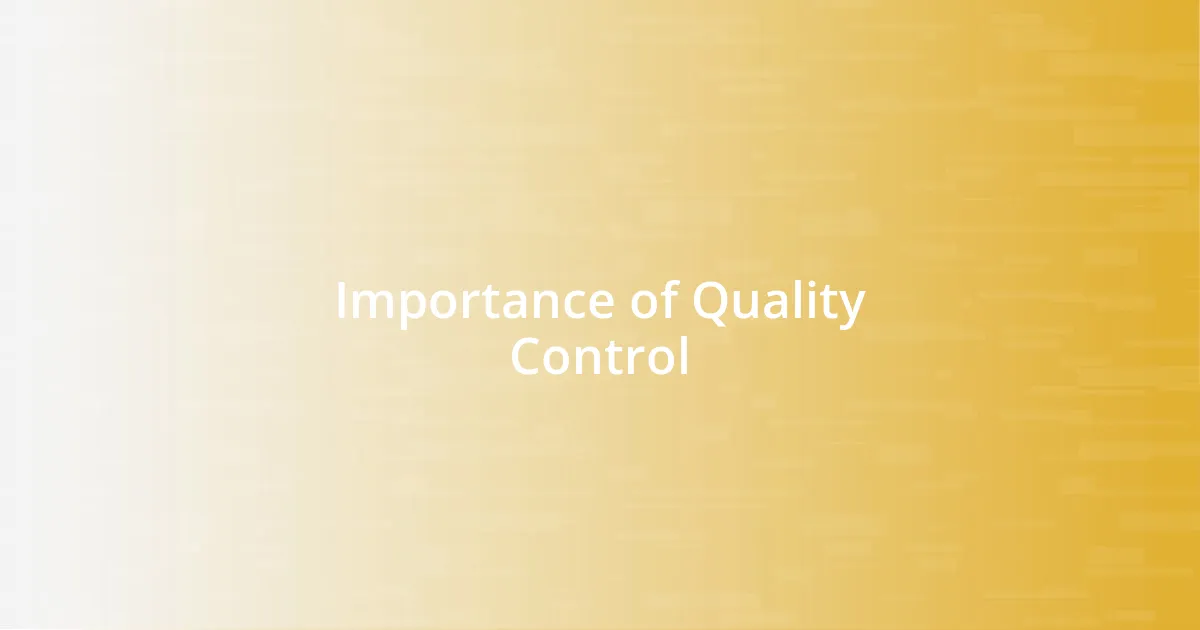
Importance of Quality Control
Quality control is the backbone of any reliable CBD product. I learned firsthand that when companies prioritize quality control, it directly impacts the safety and efficacy of the product. For instance, I once tried a CBD oil that was flagged for having inconsistencies in its potency; it was a sobering reminder of why thorough quality checks matter.
Here’s what effective quality control should include:
- Third-party Testing: Independent labs should verify the product’s purity and potency.
- Batch Consistency: Each batch should meet the same quality standards to ensure reliability.
- Contaminant Screening: Testing for pesticides, heavy metals, and other harmful substances is crucial.
- Clear Labeling: Products should clearly indicate cannabinoid concentrations and other ingredients.
Taking the time to research these aspects when choosing a CBD product can make a world of difference. I remember the peace of mind I felt knowing that the product I was using was safe and rigorously tested.
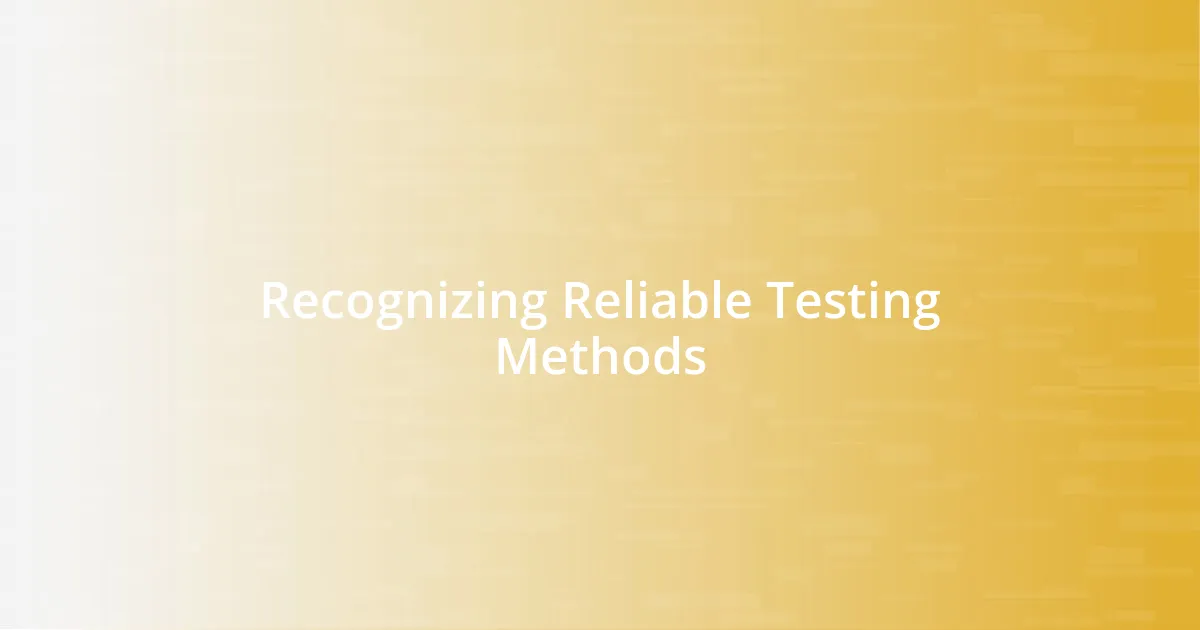
Recognizing Reliable Testing Methods
Recognizing Reliable Testing Methods is key to ensuring that the CBD products you choose are safe and effective. When I first began exploring CBD, one of the most enlightening moments for me was learning about the different testing methods used. Not all products are created equal, and understanding how reliable tests work gives me confidence in what I purchase. For instance, I once came across a brand that published its lab results online, which added a layer of authenticity that I found reassuring. Seeing those numbers made the product feel real and trustworthy.
One of the most reliable testing methods involves third-party labs. These independent labs assess products without the bias of the manufacturer. I remember the first time I read a Certificate of Analysis (COA); it felt like opening a book to a secret world of information. The COA provided details on cannabinoid profiles, terpenes, and any contaminants. This transparency helped me make informed decisions, knowing exactly what I was putting in my body.
The depth of testing can vary significantly between companies. Some may only conduct basic tests, while others go above and beyond to run comprehensive profiles. When I discovered that a product underwent extensive impurity and potency testing, I felt more inclined to try it. It’s these reliable testing methods that empower consumers like me to make choices aligned with our health goals.
| Testing Method | Details |
|---|---|
| Third-Party Lab Testing | Independent evaluations for purity and potency. |
| Certificate of Analysis (COA) | Details on cannabinoid and contaminant levels. |
| Full-Spectrum Testing | Tests for a wide range of compounds in the product. |
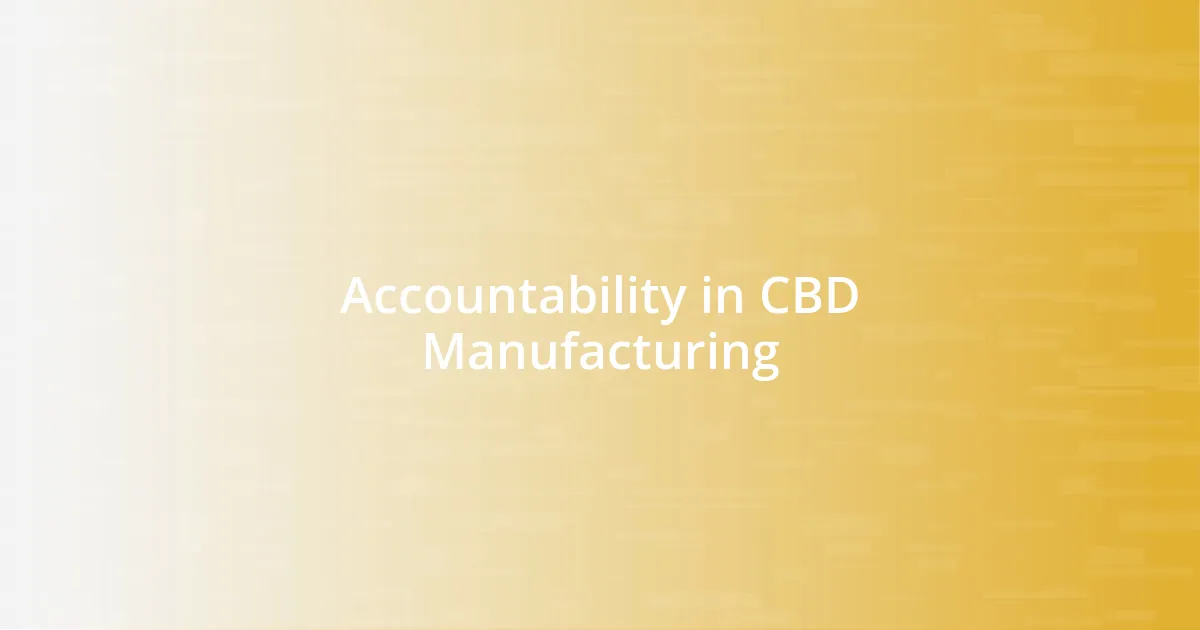
Accountability in CBD Manufacturing
Accountability in CBD manufacturing is essential, and I vividly remember the moment I learned how crucial it is for brands to take responsibility for their products. I stumbled upon a company that had a clear commitment to transparency; they not only shared lab results but also detailed their source materials. This openness made me feel like I was part of the process rather than just a passive consumer. Isn’t it reassuring when a brand stands behind its products?
One of the most startling lessons I learned was that accountability doesn’t just come from testing; it requires a culture of integrity within the company. Just like in any other industry, I realized how vital it is for CBD producers to follow ethical practices and maintain rigorous standards. Reflecting on my experiences, I once encountered a brand that had multiple recalls due to impurities. It was disheartening to see how quickly trust can erode when accountability falters. I began asking myself, how could I invest in brands that don’t prioritize responsibility?
Moreover, I found it incredibly empowering when companies actively engage with consumers. I remember participating in a Q&A session with a CBD manufacturer where they answered every question about their sourcing, testing, and even challenges faced in production. It sparked a sense of connection—I left that session feeling validated in my choice. This level of engagement highlights the importance of accountability, encouraging consumers like me to feel both informed and invested in our health journey. Don’t you think that a brand’s willingness to communicate openly speaks volumes about its commitment to safety?
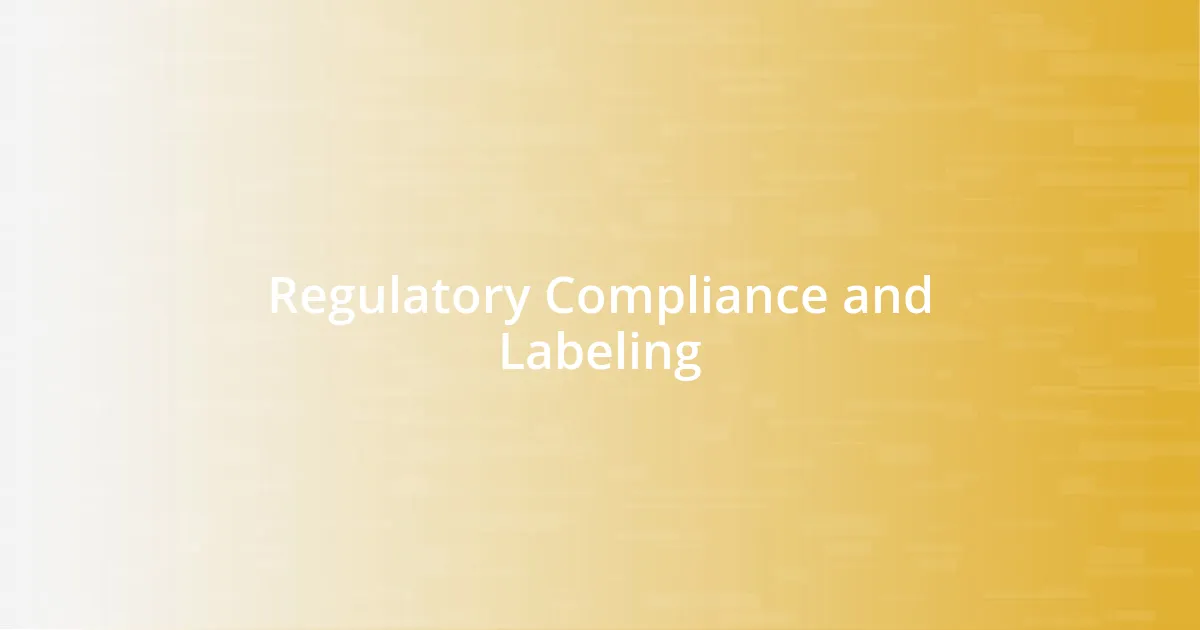
Regulatory Compliance and Labeling
Regulatory compliance is a crucial aspect of the CBD industry that shapes product safety and consumer trust. During my journey, I was amazed to learn about the strict labeling regulations that brands must adhere to. I recall buying a CBD tincture that had thorough ingredient disclosures and clear dosage instructions. It made me feel secure knowing I could follow the guidelines without any confusion. Have you ever stood in front of a shelf full of CBD products, unsure of what to choose? I’ve been there, and proper labeling can make all the difference.
Labeling goes beyond just ingredients; it also reflects legal compliance, which varies by region. One time, I came across a product that claimed to be THC-free but lacked the necessary COA to back that assertion. This raised a red flag for me, prompting questions about the brand’s integrity. Why would someone risk violating regulations when transparency is so important? The answer lies in the foundational trust we place in CBD brands. Accurate labeling is not just a requirement; it’s a promise to the consumer.
An eye-opening experience for me was discovering that mislabeling can lead to serious consequences, not just for brands, but for users too. I once read a story of a person who used a mislabeled CBD product and faced unexpected side effects. It made me realize how crucial it is for companies to not only comply with regulations but also make it a priority to ensure accuracy in labeling and information. Have you ever thought about how equipped you feel when you know exactly what you’re consuming? That sense of empowerment is what drives me to choose brands that prioritize compliance and transparency.
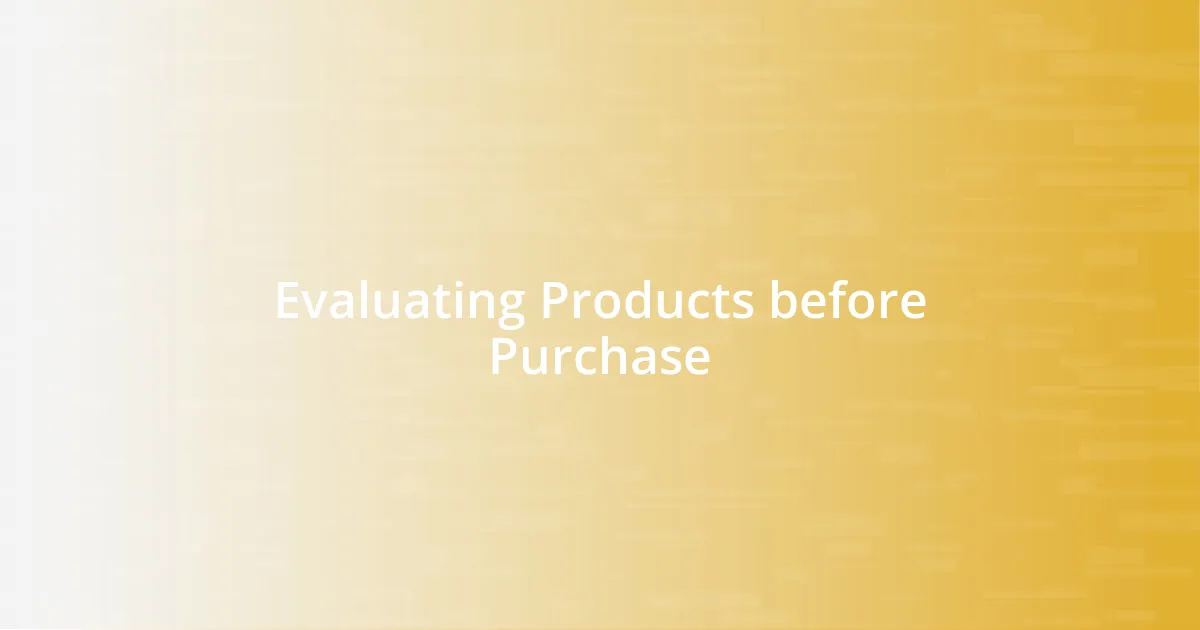
Evaluating Products before Purchase
Before making a purchase, I’ve learned to take a good hard look at product reviews and ingredient lists. I remember buying a CBD cream once that had stellar ratings online, only to find out later that it contained artificial additives. It was bittersweet realizing how easily I could have been misled. Have you ever felt that pang of disappointment after realizing you didn’t do your homework? I know I have, and it has made me more diligent in evaluating products before hitting that “buy” button.
One effective strategy I’ve adopted is to check for third-party lab results. The first time I sought out a Certificate of Analysis (COA) was eye-opening. Finding a brand that offered transparent, independent testing gave me peace of mind, as I could verify the product’s content myself. Seeing the lab results helped me feel more confident and secure in my purchase. Do you often consider how much effort goes into ensuring a product meets safety standards? It’s these small steps that lead to a safer consumer experience.
Additionally, exploring the brand’s history and commitment to sustainable practices has become part of my evaluation process. I vividly recall researching a brand that emphasized organic farming and environmentally friendly production methods. Knowing that my purchase aligns with my values adds a layer of satisfaction. Isn’t it great when you can feel good about what you’re buying, both for yourself and for the planet? This holistic approach to product evaluation has transformed my shopping habits and strengthened my trust in the brands I choose.

Benefits of Third Party Testing
The benefits of third-party testing in the CBD industry cannot be overstated. I remember the first time I encountered a product with a third-party lab report attached. It was like finding a trusted friend in a sea of uncertainty. Knowing that an independent laboratory evaluated the product gave me the assurance I needed to make an informed choice. Why wouldn’t every consumer seek that kind of verification?
When I discovered that third-party testing not only validates the potency of the product but also checks for contaminants, it was a game-changer. I had tried a few products before learning this, and I can’t help but think about the risks I was exposed to without such transparency. Just one bad batch could contain harmful substances like heavy metals or pesticides. Have you ever considered what could compromise your health in the name of wellness? Trusting brands that prioritize third-party testing has become non-negotiable for me.
I find it fascinating how third-party testing can actually enhance a brand’s credibility. I remember discussing with a friend who was unsure about trying CBD because of mixed reports on its effectiveness. I shared with her some brands that consistently passed rigorous testing, and it lit up a spark of curiosity in her eyes. It’s incredible how that kind of transparency can turn skepticism into confidence. Don’t you agree that knowing a product has undergone independent testing transforms the consumer experience?










